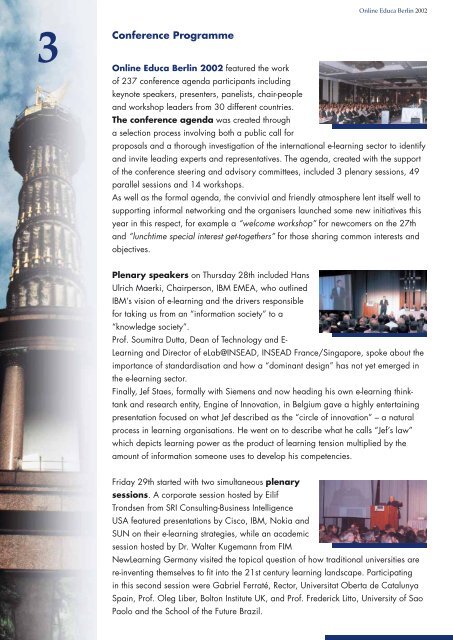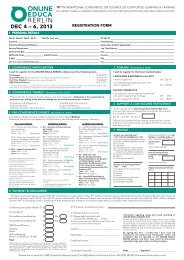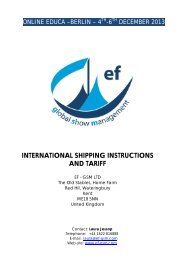Online Educa Berlin 2002
Online Educa Berlin 2002
Online Educa Berlin 2002
- No tags were found...
Create successful ePaper yourself
Turn your PDF publications into a flip-book with our unique Google optimized e-Paper software.
<strong>Online</strong> <strong>Educa</strong> <strong>Berlin</strong> <strong>2002</strong>3Conference Programme<strong>Online</strong> <strong>Educa</strong> <strong>Berlin</strong> <strong>2002</strong> featured the workof 237 conference agenda participants includingkeynote speakers, presenters, panelists, chair-peopleand workshop leaders from 30 different countries.The conference agenda was created througha selection process involving both a public call forproposals and a thorough investigation of the international e-learning sector to identifyand invite leading experts and representatives. The agenda, created with the supportof the conference steering and advisory committees, included 3 plenary sessions, 49parallel sessions and 14 workshops.As well as the formal agenda, the convivial and friendly atmosphere lent itself well tosupporting informal networking and the organisers launched some new initiatives thisyear in this respect, for example a “welcome workshop” for newcomers on the 27thand “lunchtime special interest get-togethers” for those sharing common interests andobjectives.Plenary speakers on Thursday 28th included HansUlrich Maerki, Chairperson, IBM EMEA, who outlinedIBM’s vision of e-learning and the drivers responsiblefor taking us from an “information society” to a“knowledge society”.Prof. Soumitra Dutta, Dean of Technology and E-Learning and Director of eLab@INSEAD, INSEAD France/Singapore, spoke about theimportance of standardisation and how a “dominant design” has not yet emerged inthe e-learning sector.Finally, Jef Staes, formally with Siemens and now heading his own e-learning thinktankand research entity, Engine of Innovation, in Belgium gave a highly entertainingpresentation focused on what Jef described as the “circle of innovation” – a naturalprocess in learning organisations. He went on to describe what he calls “Jef’s law”which depicts learning power as the product of learning tension multiplied by theamount of information someone uses to develop his competencies.Friday 29th started with two simultaneous plenarysessions. A corporate session hosted by EilifTrondsen from SRI Consulting-Business IntelligenceUSA featured presentations by Cisco, IBM, Nokia andSUN on their e-learning strategies, while an academicsession hosted by Dr. Walter Kugemann from FIMNewLearning Germany visited the topical question of how traditional universities arere-inventing themselves to fit into the 21st century learning landscape. Participatingin this second session were Gabriel Ferraté, Rector, Universitat Oberta de CatalunyaSpain, Prof. Oleg Liber, Bolton Institute UK, and Prof. Frederick Litto, University of SaoPaolo and the School of the Future Brazil.





